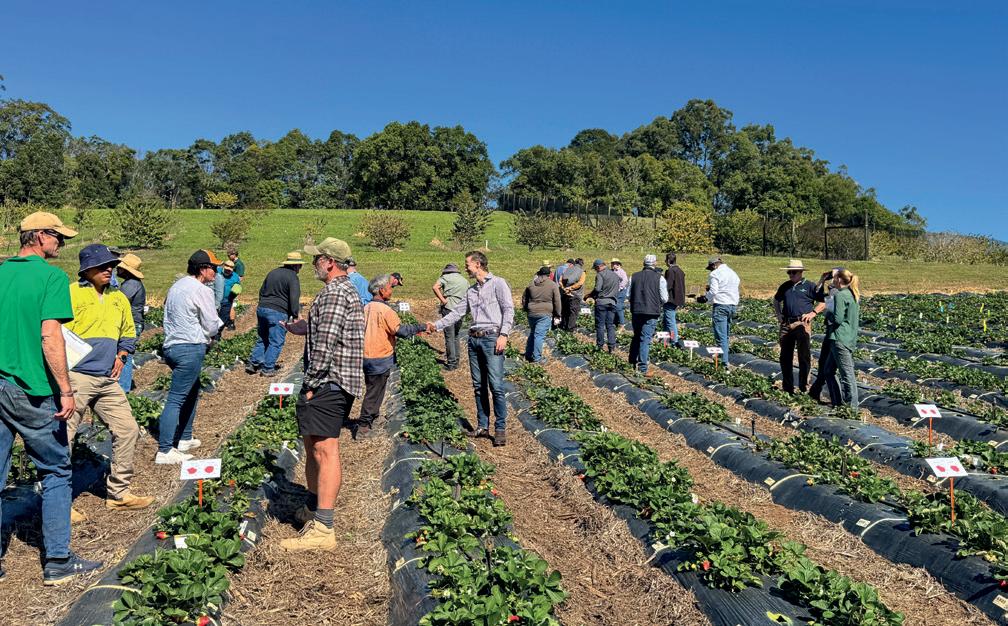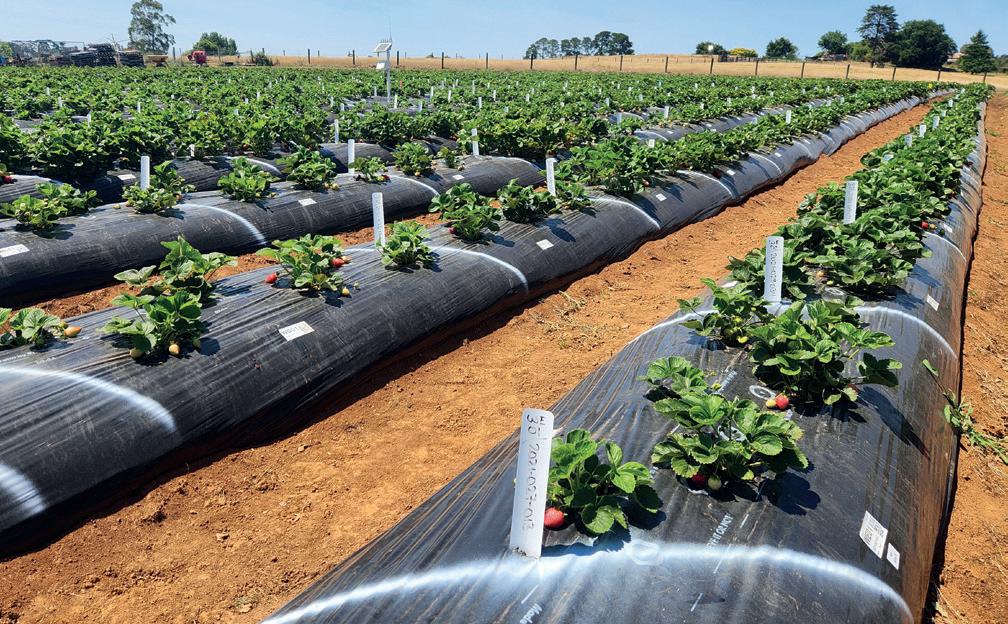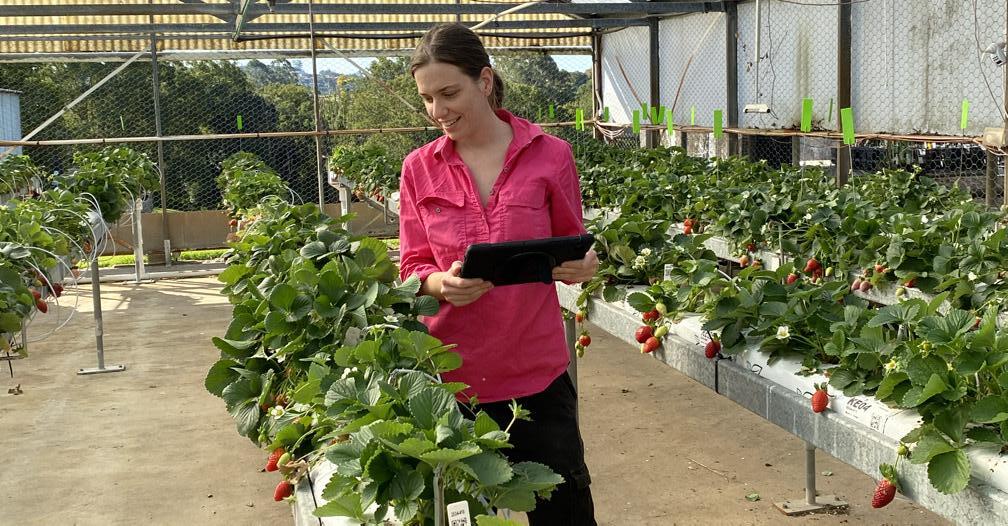
8 minute read
Australian Strawberry Breeding Program Update
Jodi Neal – Principal Plant Breeder & Katie O’Connor – Plant Breeder, Australian Strawberry Breeding Program Team, Queensland Department of Primary Industries
This article provides a Temperate season wrap-up and activity update for the project BS22000: Australian Strawberry Breeding Program
The Australian Strawberry Breeding Program (ASBP) has been hard at work over the past six months, wrapping up the temperate season and diving into the start of the subtropical and Mediterranean seasons. With a focus on developing strawberry varieties specially adapted to Australia’s temperate, subtropical, and Mediterranean climatic regions, the program is committed to improving grower profitability and consumer satisfaction. By prioritising traits such as higher yields, larger fruit sizes, disease resilience, and improved taste and appearance, the ASBP is working to help deliver a stronger, more sustainable strawberry industry.
Over the last six months the ASBP team has continued to actively engage with growers and the broader industry. Our annual Temperate Reference Group Meeting was held on 26 March 2025, where we formally engaged with representatives from industry to help guide our temperate breeding program. Subtropical and Mediterranean Reference Group Meetings will be held later this year.
On 16 July, we also worked with Berries Australia to host a strawberry field day at the Maroochy Research Facility. Over 45 growers and industry representatives attended, exploring promising new accessions in the subtropical pipeline (Figure 1). Three accessions in partıcular received strong interest from attendees, reinforcing the program’s progress in meeting grower needs.
Lastly, in June this year, breeders Jodi Neal and Katie O’Connor, along with biometrician Ky Mathews, attended the 17th Australasian Plant Breeding Conference in Perth. They presented key findings from the program and gained valuable insights from global experts, which will be applied to accelerate gains from future breeding efforts.
Following is a detailed look at what we’ve achieved since the last breeding program update.
For those who were unable to attend the Field Day in person, a video version is now available to watch through the Resource Library which includes Dr Jodi Neal’s update presentation, a look at two of the most promising new potential varieties and some reflections from one of the growers attending the day.
View the video at bit.ly/QLD-STR-160725 or search ‘Strawberry Field Day’ in the Resource Library at bit.ly/BA-RL
Temperate Breeding Trials
The temperate clonal trial was planned to continue until the end of May 2025, however weather conditions and extensive damage from birdlife led to a slightly early season wrap-up in mid-May. Twenty-seven temperate accessions with strong performance across key traits have been selected for re-trialling in 2025/26. An additional 101 stage 1 seedlings have been selected from a total of 14,000 for early-stage clonal trialling, ensuring a strong pipeline of promising accessions for future evaluation.
Promising advanced temperate accession ‘2017-025-130’ has also been multiplied by the Toolangi Certified Strawberry Runner Growers' Co-Op and distributed to seven growers across four states for large-scale trialing in the 2025/26 season (100–1,000 plants each). Feedback from these trials will inform a commercialisation decision for this accession at the end of the season. ASBP is very grateful for all growers involved in trialling our promising selections.
Subtropical Breeding Trials
In the subtropical regions, we planted around 9,000 stage 1 seedlings between late February and March 2025. This included 2,500 seedlings at the Maroochy Research Facility (MRF) in Nambour and 6,500 at the Bundaberg Research Facility.
At MRF, 82 early-stage (stage 2) and 41 advanced-stage (stage 3+) accessions were planted in March. Similar to commercial farms in the region, subtropical trials started very slowly this season, with low yields continuing into July. Early performance of breeding accessions has also been atypical due to abnormal weather, which has similarly been seen in commercial production of many varieties including Stella-ASBP.
Excitingly, the accessions first to start fruiting in the subtropical trials this season were members of the most recent cohort. This means that the ASBP’s push for earlyyielding subtropical accessions has been successful and improvements will continue into the future.

Seven of the most advanced subtropical accessions are also currently being trialled across four farms this season, including tabletop trials in southeast Queensland and Bundaberg. Larger-scale on-farm trials have also commenced, with three growers testing over 100 plants of multiple advanced-stage accessions prior to potential commercial release.
Among these are two promising red-fruited accessions ‘2019-077’ and ‘2021-090’, as well as a new white-fruited accession ‘2021-232’ that has generated significant interest from growers.
Mediterranean Breeding Trials
In the Mediterranean region, around 4,000 seedlings were planted at MRF in March, as well as 14 advanced-stage and 82 early-stage accessions at Bullsbrook, WA, in April. Six advanced-stage accessions are being trialled across three farms, with two new growers joining the program this year. These growers have shown particular enthusiasm for the novelty white and blush varieties, and ASBP is very much looking forward to feedback regarding these varieties as the season progresses.
Disease Resistance and Genetic Advancements
Disease resistance remains a key focus of the ASBP, with advanced accessions annually tested for resistance to five diseases/disorders, and tolerant accessions used as parents for the next generation.
Recent highlights include:
• Charcoal Rot Resistance: Trials for 21 accessions have been completed, with statistical analysis underway.
• Anthracnose Rot Resistance: Screening trials for 15 accessions have concluded in recent weeks, and statistical analysis will commence soon.
• Powdery Mildew Resistance: The 2025 powdery mildew screening trial was planted in April and includes 14 early-stage and 10 advanced-stage accessions. Also included are seedlings from each of the three regions, from crosses between tolerant parents and parents with good agronomic traits.
• Fusarium Wilt Resistance: Annual screening is set to begin in August 2025.
• Red Leaf Disorder: Annual surveying of Red Leaf Disorder (RLD) susceptibility has commenced in the 2025 subtropical breeding trial and will begin soon in the Mediterranean trial. Preliminary genetic analysis suggests that susceptibility is strongly controlled by only a few genes, which may provide insight into the cause of RLD. Breeding for RLD tolerance over recent years has been highly successful, with significantly increased tolerances in the breeding population.
To ensure the health of foundation plants, virus testing has been completed for 161 temperate selections, with testing for 88 subtropical and Mediterranean selections still in progress.
On the genetic front, DNA analyses of recent accessions have allowed us to predict performance for various traits in stage 1 seedling selections prior to any field data being collected. Approximately five elite stage 1 accessions from each region have been selected this year for use as parents in crosses to produce the next generation of seedlings, in addition to our regular crosses. This is expected to accelerate gain in traits such as yield, fruit size, and sweetness across the breeding population.

International Collaboration
The ASBP continues to collaborate with international partners to enhance genetic diversity. Each year, we exchange seed with the University of Florida breeding program for subtropical genetics, and with Vissers Plant Innovators in the Netherlands for temperate. Not only does this allow the exchange of genetic diversity, which ensures that our breeding programs do not become too inbred, but it also allows the introduction of genes for important traits such as disease resistance and exciting new flavours.
Looking Ahead
The ASBP remains committed to delivering superior strawberry varieties suited to Australia’s three climatic growing conditions. Our work is guided by the invaluable feedback and support of growers, whose input helps shape the future of the program.
If you’d like more information or have feedback to share, please contact Jodi Neal at jodi.neal@dpi.qld.gov.au or on 07 5381 1352. Your insights are crucial to the success of the program, and we look forward to continuing this journey together.
Acknowledgements
The Australian Strawberry Breeding Program has been funded by Hort Innovation using the strawberry research and development levy and matched funds from the Australian Government, with co-contributions from the Queensland Government through its Department of Primary Industries.
We thank the contributions by the Temperate, Subtropical and Mediterranean Reference Groups who have helped guide the program, the Industry Development Officers, and all other industry members who provide feedback, advice, and support.
We are also extremely grateful to all the fruit producers in all states who have trialled, collected data on, and given feedback on our on-farm accessions. This has helped us make more informed and better commercial judgments.
The Australian Strawberry Breeding Program team members include Jodi Neal (project lead), Michaela Antoine (Perth field assistant), Freya Brinkley (Nambour lab assistant), Mitchell Gates (Nambour lab assistant), Joanna Gillespie (genetics and virus indexing), Dilmini Hettiarachchi (PhD student), Lilian Kass (Nambour field assistant), Dale McKenna (Nambour field technical officer and hydroponics), Alan Noon (Wandin field assistant), Katie O’Connor (breeding and genomics), Michelle Paynter (virus indexing, tissue culture, and pathology), Melanie Ritter (Wandin field assistant), Karen Spencer (Wandin operations manager), and Louella Woolcock (Nambour field and glasshouse operations manager).




